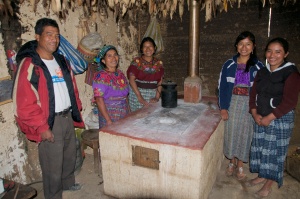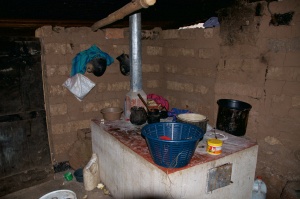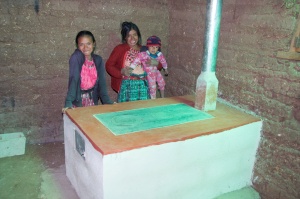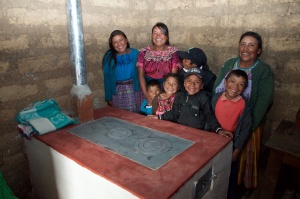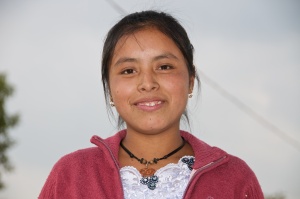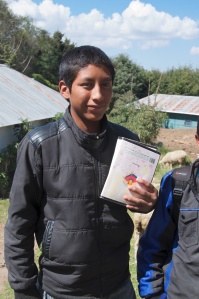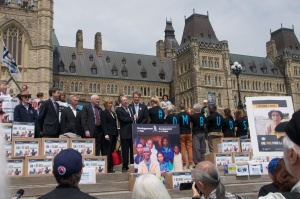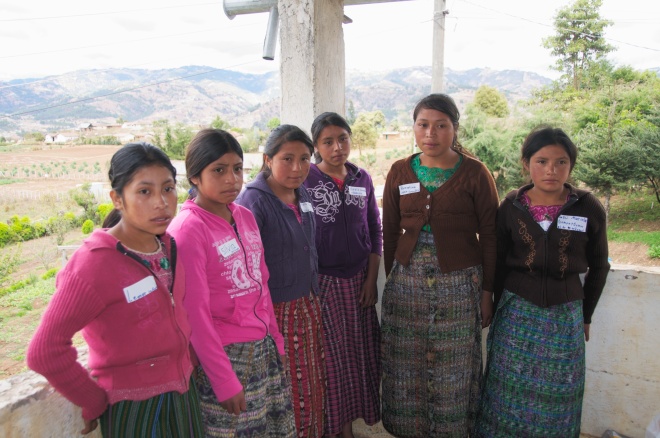Thank You Notre Dame H. S. for your support!
In 2015 Notre Dame High School students and staff in Ottawa dedicated their Lenten fundraising efforts to supporting the Guatemala Stove Project. Over $2,200.00 was raised to build 5 improved cooking stoves and provide bursary support for 2 students.
GSP volunteer Liz Ballantyne-Jackson reported back to the school in February 2016 at a kick-off assembly for the 2016 Lenten season. A revised version of the assembly presentation in a YouTube video format can be accessed here: https://youtu.be/e8M8i2ZKNVM
The stories and pictures below also help to explain the typical daily challenges faced by 5 of the families visited by Ottawa GSP volunteers in January 2016.
Stove #1 – Chipel Stove #3
Family of Marta Estela. Marta is a 33 year old widow with a 12 year old son. Her husband was killed in a road accident a few years ago. This stove will be used by an extended family of 9 people and 3 generations. Marta and her son Wener live with her parents, 3 sisters and 2 nephews. Marta is a member of the AMMID organization, which is a partner organization of the GSP. This is a family that values education. Two of Marta’s younger sisters walk 90 minutes each way to attend high school.
Stove #2 – Chipel Stove #2.
Family of Lorinda. Seven family members will use this stove. I took this picture through the window of the family home because Lorinda and her family had gone to work on a coffee ‘finca’ or farm on the Pacific coast for the months of January and February. A neighbor and fellow member of AMMID told us the family information. Several other families in this community were not present when we tried to document their stoves because they had also gone to the ‘fincas’. This usually means extreme poverty in a community because the families cannot support themselves from one crop season to another and need the extra income from picking coffee to purchase food. A worker is paid by weight for the amounts they pick, so all able family members help at the ‘finca’. Often children miss several weeks of school to go with their families and younger children have been reported to come back with severe cases of malnutrition.
A picture in the video shows a truck taking families to the ‘finca’. They are crowded onto trucks like cattle with their belongings for the long ride to the coast.
Stove #3 – Tuimuj Stove #2.
Family of Maria Filomena. She is 27 years old and the mother of 3 children – ages 8, 6 and 1 year old. She is the ‘promotora’ of her AMMID group, which means she helps organize meetings and attends agricultural training workshops. At these workshops she learns improved agricultural techniques, which she then teaches to the others in her group. Filomena escorted us through her community to visit the homes where other GSP stoves were built. During our visit she spoke to our AMMID worker about problems she is having with her husband who beats and abuses her. She was asking our guide, Reyna, for advise about what to do, as there are no social services or shelters to support women who are suffering from domestic abuse. Reyna gave her some advice as she herself went through a similar domestic abuse situation in the past.
In the video there is a short segment of Filomena showing us how she is preparing a field for planting in the upcoming rainy season. She uses an ‘azedon’ or hoe to turn the soil. She’ll work on this field off and on for several weeks to get it ready for planting. You can see how manually intensive the work is and how dry and dusty the fields are. We are always amazed at how the women work so hard and how they continue to maintain their culture by wearing traditional clothing and footwear to travel through the mountains and work in the fields.
Stove #4 –Tuimuj Stove #28
Family of Eugenia, 36. Eugenia is a widow and mother of 4 living children. She has had a string of unfortunate events, which can spell near disaster for a family with limited economic resources. During our visit to document her stove we heard about her family situation, which is one of the saddest we’ve heard in a long time. Her husband died over 5 years ago from an illness. (Many times common illnesses can end in death because they are not treated promptly by doctors and medicine.) A couple of years ago she started living with another man who said he would look after her and her family. She became pregnant and had another child, but he left her soon afterwards. Her oldest son went to Guatemala City to work so that he could send money back to help the family. This son died in an accident while there and she had to go to Guatemala City to bring back his body for burial in their community. She spent all of her money on this. On top of these sad events, her house was damaged in 2012 by an earthquake and she had to spend money at that time to repair the back wall of her adobe house with boards and posts to create a new wall. With all of these extra expenses, her 3 oldest children have dropped out of school because they have no money to pay for school supplies or daily snacks. She has two sons, 17 and 15 years old, who have only gone as far as grade 4 of primary school. Her 13 year old daughter has only achieved a grade 2 level and has not returned to school this year.
We are distressed when we meet families in these circumstances and are unable to help them. When we go to Guatemala we often find ourselves in difficult situations like this one where we would like to help but can’t because our resources are so limited.
Stove #5 – Tuimuj Stove #10
Family of Andrea, 43. This stove will cook for 9 family members. This family lives in a community where there is no nearby source of water. All able family members get up at 4 am several times a week to travel back and forth to a stream in a deep ravine about an half hour trek away from where they live. They make numerous trips back and forth to get water before the children go to school. In the video there is a short clip showing Andrea’s family arriving back from collecting water just as we were waiting to take their picture around the new stove. I am amazed at the strength and endurance of these families and their drive to make things better for their children. Andrea makes a little bit of extra money reselling buns and bread, which she purchases in town. This family is working hard to survive daily challenges and build a better future.
Bursary students:
Notre Dame H. S. fundraising efforts are helping to support 2 students through the AMMID bursary project.
Morelia, a 17 year old grade 9 student, recorded this message of thanks during our January 2016 visit: My name is Morelia Carolina from the town of Chamaque. I study at the Instituto in Escipulas and I am very thankful to Nuestra Señora/Notre Dame School of Ottawa. I am very thankful to you and thanks to you I am studying here. Simply put all I can do is thank you, thank you very much. You can hear her speaking in excellent Spanish in the video. Morelia is fluent in both Spanish and Mam, her Mayan language. Her father died several years ago from problems related to alchoholism. Her mother supports her 3 children by weaving skirt fabric on a rented loom in her home. Morelia was forced to drop out of school for 2 years after grade 6 because her mother did not have the funds to pay school fees and buy school supplies. Morelia went back to school 2 years ago after receiving GSP bursary funding. She is now in grade 9 and doing very well. She has received awards for participation and achievement at her grade level and has aspirations to continue her education after grade 9 if bursary funds are available.
Children in Guatemala face multiple challenges to getting an education. Girls in particular face many barriers and often are forced to drop out of school after the primary level due to poverty issues.
A typical day of a young female student in rural Guatemala would be similar to this:
- get up about 6:00 am. Take corn to a nearby molino or mill for grinding or grind by hand with a metate.
- eat breakfast about 6:30 am, make tortillas, wash the dishes
- 7:30 am – feed the pigs
- 8:30 wash clothes and hang them up to dry
- 10:00 am – do homework and review schoolwork
- 11:00 am – eat and help prepare lunch
- 12:00 – 6 pm – go to school – 20 to 40 minute walk or longer with friends; 15 minute recess or school break
- 6:30 pm – eat, help make supper
- 7:30 pm – help clean up pots and pans after meal
- 8:00 pm – go to bed, no electricity in the house, so usually unable to do additional homework or read
Saturday and Sundays – go with the family to gather wood (leña) in the forest for cooking; take the sheep to pasture, wash clothes, help look after younger children and numerous other activities. Many children, girls in particular, are forced to drop out of school in order to help full time with these daily activities.
Notre Dame Funds are proving support for Exceptional Student – Rubelsi, who is deaf and mute.
Rubelsi – decisions had to be made about how we could continue to support the education of this young boy (14 years old). He was finishing grade 6 of ‘primaria’ but not achieving anywhere close to his age appropriate grade level. His primary school can’t help him anymore and it would be pointless for him to go onto the next level of middle school or ‘ciclo basico’, which started in January 2016, as there would be no special help for him. We are unable to raise the funds to send him to a special school for the deaf in San Marcos because room and board would cost too much. In consultation with his grandparents (Rubelsi’s parents have deserted him and his younger brother) we have decided the next best thing would be for him to continue to receive individual help with sign language and a basic, practical education that will help him function better in his community as he gets older. He’ll continue to receive tutoring this year, once or twice a week, with a teacher of the deaf and our community support teacher in functional literacy and practical life skills like understanding money and how to communicate with strangers. He’ll also work during the week with his grandfather in a family store. Money from the Notre Dame 2015 fundraising is currently helping with those activities.
GSP Bursary Projects.
The GSP currently supports a total of 17 students in 2 areas of Guatemala – Cantel, in the Departamento of Quetzeltenango and Comitancillo in the Departamento of San Marcos.

